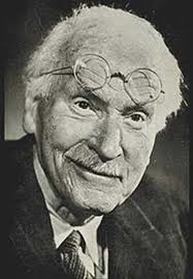
C G Jung. 1875 - 1961
Carl Gustav Jung was a Swiss psychotherapist and psychiatrist who founded analytical psychology, a branch of modern depth psychology. Jung proposed and developed many concepts which have passed into common usage and which continue to inform contemporary life, for example: complex, archetype, persona, shadow, anima and animus, personality typology, dream interpretation, individuation, collective unconscious, introversion, extroversion and many other ideas. Jung also had a deep appreciation of our creative life and considered spirituality a central part of the human experience. His method of interpretation of symbolic expression not only deepens our understanding of personal material, opening the psychodynamics of our personal biographies and dreams, but the deeper, collective patterns which develop within cultures as well.
In his memoir, Memories, Dreams, Reflections, Jung wrote that meaning comes “when people feel they are living the symbolic life, that they are actors in the divine drama. That gives the only meaning to human life; everything else is banal and you can dismiss it. A career, producing of children, are all maya (illusion) compared to that one thing, that your life is meaningful.”
In 1917 he wrote in his essay “On the Psychology of the Unconscious” of the personal shadow as the other in us. The negative side of the personality, the sum of all unpleasant qualities we like to hide. It embarrasses or shames us. “Everything with a substance casts a shadow, the ego stands to the shadow as light to shade.”
Carl Gustav Jung was a Swiss psychotherapist and psychiatrist who founded analytical psychology, a branch of modern depth psychology. Jung proposed and developed many concepts which have passed into common usage and which continue to inform contemporary life, for example: complex, archetype, persona, shadow, anima and animus, personality typology, dream interpretation, individuation, collective unconscious, introversion, extroversion and many other ideas. Jung also had a deep appreciation of our creative life and considered spirituality a central part of the human experience. His method of interpretation of symbolic expression not only deepens our understanding of personal material, opening the psychodynamics of our personal biographies and dreams, but the deeper, collective patterns which develop within cultures as well.
In his memoir, Memories, Dreams, Reflections, Jung wrote that meaning comes “when people feel they are living the symbolic life, that they are actors in the divine drama. That gives the only meaning to human life; everything else is banal and you can dismiss it. A career, producing of children, are all maya (illusion) compared to that one thing, that your life is meaningful.”
In 1917 he wrote in his essay “On the Psychology of the Unconscious” of the personal shadow as the other in us. The negative side of the personality, the sum of all unpleasant qualities we like to hide. It embarrasses or shames us. “Everything with a substance casts a shadow, the ego stands to the shadow as light to shade.”
